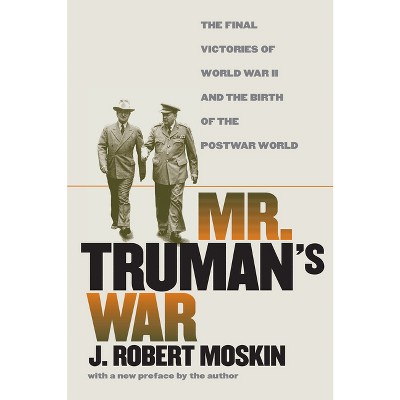Sponsored

Secret Weapons and World War II - (Modern War Studies) by Walter E Grunden (Hardcover)
In Stock
Sponsored
About this item
Highlights
- The atomic bomb.
- Author(s): Walter E Grunden
- 348 Pages
- History, Military
- Series Name: Modern War Studies
Description
Book Synopsis
The atomic bomb. Rocket-propelled bombs. Jet propulsion. Radar. By failing to develop effective programs for such "secret weapons," Japan increased the probability that it could not triumph over its more advanced enemies. While previous writers have focused primarily on strategic, military, and intelligence factors, Walter Grunden underscores the dramatic scientific and technological disparities that left Japan vulnerable and ultimately led to its defeat in World War II. Grunden's fascinating analysis of this fundamental flaw in the Japanese war effort seamlessly weaves together science, technology, and military history to provide an entirely unique look at a crucial but understudied aspect of World War II. Comparing the science and weapons programs of all the major combatants, he demonstrates that Japan's failure was nearly inevitable, given its paucity of strategic resources, an inadequate industrial base, the absence of effective centralized management to coordinate research, military hostility toward civilian scientists, and bitter inter-service rivalries. In the end, Japan could not overcome these obstacles and thus failed to make the transition to the kind of "Big Science" it needed to ward off its enemies and dominate the Far East. In making his case, Grunden provides comprehensive coverage across a range of major weapons systems, including the most persuasive explanation yet developed for Japan's failure to develop nuclear weapons. He also assesses the failure of the Japanese navy to fully appreciate the combat utility of radar, describes the largely impotent "death ray" that remained under development until the last days of the war, and traces the expansion into jet propulsion technology that came too late. Japan did, however, achieve one inauspicious success by developing biological agents capable of wreaking havoc in America's western cities. Grunden not only illuminates the program and the logic behind its success but also unflinchingly describes our own nation's complicity in the postwar cover-up of that program, raising issues that remain resonant and relevant today. Drawing extensively upon Japanese as well as English-language sources, Secret Weapons and World War II is written with clarity and insight and a remarkable integration of sources from a diverse array of disciplines. The book makes a unique and significant contribution to the histories of World War II, Japan, science, and technology, chronicling another chapter in the endless pursuit for "ultimate" weapons.Review Quotes
"Provides a detailed account of Japanese science-based weapons research and development (R&D) programs in World War II. . . . Grunden writes clearly and presents his evidence well. For someone like me, who is not a specialist on Japan, this is a most useful contribution to the literature on science and technology in World War II, especially because the Japanese experience is examined in comparative perspective."--Pacific Historical Review
"A superb study of how Japan mobilized science and technology to develop advanced weapons during World War II."--Technology and Culture
"A careful study that addresses the cardinal reason that Japan did not--indeed, could not--win: it simply lacked the resources. Those resources included not only raw materials but the proper and creative coordination of the scientific establishment with the war effort."--American Historical Review
"From impressive research in myriad sources, most notably Japanese language materials, Grunden has been able to compare Japan's faltering efforts in science and technology with the successful advanced programs of other World War II belligerents. He thus provides not only a comprehensive examination of Japanese failures but also an illuminating description of how the United States, Great Britain, the Soviet Union, and Germany went about designing and building key weapons systems. In so doing, he discusses a broad spectrum of major weapons and programs. . . . Grunden offers an insightful analysis of the reasons for Japan's scientific/technological failures.. . . . Grunden's comprehensive volume is a unique and revealing examination of a key aspect of World War II."--Army
"An important book. This is not just a book about secret weapons, nor only about Japan's secret weapons. It is instead, a comparison of the scientific and technological programs of all the major Allied and Axis powers with developments in Japan. This is 'Big Science, ' the linking of government, universities, research institutes, strategic planners, and economic institutions into large-scale coordinated projects."--Journal of Military History
"All in all, Grunden offers a valuable contribution to an important aspect of Japan's war, and the book repeatedly reminds readers that war-winning weapons don't just magically appear in the hands of fighting men--nations must possess properly mobilized and organized scientific establishments in order to remain capable of conducting modern warfare."--Stone and Stone Second World War Books
"This is a splendid study of the role of science in World War II. On the basis of meticulous research, the author presents a comprehensive account of the ways in which scientific discoveries and their technological applications in the United States, Britain, the Soviet Union, Germany, and Japan altered the war they fought and determined its outcome. In particular, Grunden shows that the shortage of civilian scientists, the lack of coordination among bureaucratic organizations, the rivalry between army and navy, as well as the relative paucity of raw materials doomed Japan's war efforts against the United States that did far better than Japan in all these areas. One exception was biological weapons, and the book gives a brief but reliable account of the notorious 731 unit in Manchuria that conducted experiments on humans--but whose principal culprits escaped war crimes trials after the war because, as a U.S. official stated in 1947, 'The value to the U.S. of Japanese BW data is of such importance to national security as to far outweigh the value accruing from war crimes prosecution.' Altogether, the book offers a definitive analysis of the impact of scientific research on weapons development and military strategy during World War II."--Akira Iriye, author of Power and Culture: The Japanese-American War, 1941-1945
"A strikingly original, very insightful, and highly stimulating work that demonstrates convincingly that Japan tried but failed in its efforts to apply what Grunden calls Big Science to its war effort."--Edward Drea, author of MacArthur's ULTRA: Codebreaking and the War against Japan, 1942-1945
"A path-breaking tour de force. There's no work quite like it in its comprehensive coverage across a range of major weapons systems, in the depth of its analysis, or in its expert use of the most important Japanese as well as English-language sources."--Mark R. Peattie, coauthor of Sunburst: The Rise of Japanese Naval Air Power
"Beautifully written and impressively researched, Grunden's splendid work is a real gem."--Michael A. Barnhart, author of Japan Prepares for Total War
Shipping details
Return details
Frequently bought together
Trending Non-Fiction

















